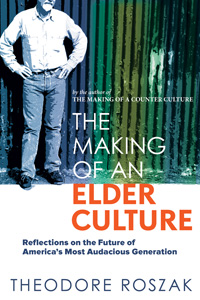 One of the great thrills of existence is that there is an endless amount to learn. I recently wrote a blog post predicting that as baby boomers entered the last third of their life there would be a resurgence of the 60’s values that many held in their youth. I was excited to discover that I was not alone in this hope. Dr. Theodore Roszak, famous for his culture-defining 1968 work, The Making of a Counterculture, and as a leading proponent of ecopsychology, has written a book on this very topic called The Making of an Elder Culture , published by New Society Publishers.
One of the great thrills of existence is that there is an endless amount to learn. I recently wrote a blog post predicting that as baby boomers entered the last third of their life there would be a resurgence of the 60’s values that many held in their youth. I was excited to discover that I was not alone in this hope. Dr. Theodore Roszak, famous for his culture-defining 1968 work, The Making of a Counterculture, and as a leading proponent of ecopsychology, has written a book on this very topic called The Making of an Elder Culture , published by New Society Publishers.
It has been a joy to read this book and become familiar with the work of Dr. Rosjak (who I am embarrassed to admit I was not familiar with — there’s that joy of new discovery!). This 76-year-old maintains and embodies the spirit that he writes about. He writes with a vigor and an idealism of a person one-third his age. In his latest book Rosjak makes a compelling case that as the baby boomers live for decades past 65, they will reengage with their original, countercultural values and take a leadership role in making the world a better, fairer place.
Roszak sees the baby boom generation as the leading edge of a profound change in demographics that will dominate world culture for the foreseeable future. The combination of lowering birth rates and longevity will make the world an older, and hopefully, wiser place. The 60’s were a time when we believed that if we raised individual consciousness we could change the world. Dr. Roszak agress with the Confucian concept that we cannot “pull the shoots.” That is, we must respect nature’s rate of growth and change. There is nothing, he asserts, that has the potential to raise consciousness like aging. When vast numbers of people live into their 90’s and beyond, their values will shape our world. We will become a world that prioritizes wellness, sustainable living, and learning. The values of consumption and growth for growth’s sake will give way to a world where mutual care will be of utmost concern. He lays down a challenge for this aging generation. He says that, “Theirs must be a noble, far-sighted cause. They must be the spearhead of a compassionate economy that spreads its benefits to everyone.” He has the audacity to propose an optimistic world vision that results in a healthy relationship with the places we live and our broader environment, and leads to a spiritual realization.
Discovering the works of Roszak has particular meaning for me because I am a proud member of the Radical Passe. The values of the counterculture have stuck with me through the decades of narcissism, greed and fear. It isn’t just the ’60’s that have had a sustained appeal for me. I’m a fan of a whole world of thought that flowered with romanticism in 19th century Europe and passed on into a coma in 1980 with the election of Ronald Reagan. This was a tradition of humanism. It included the belief that the unexamined life was not worth living. It questioned the alienating values of industrial capitalism. Its religion was love. This tradition included Carl Jung, John Lennon and Ralph Waldo Emerson. It brought us the art films from Jean Renoir to Vittorio De Sica. We believed in the experiential educational principles of John Dewey and the therapy of Fritz Perls. It was based on the belief that there was something better to life than the world we inherited: that money, stuff and fitting in were not life’s ultimate goals and something “more” was worth fighting for.
Unfortunately, since this scene is mostly passed and not comprehended by most, my heroes are mostly dead. Ashley Montagu, Erich Fromm, Confucius and Tolstoy are all gone. (There are a few exceptions, including Harville Hendrix and some of my personal teachers who are not so well known). So I sometimes feel a little lonely at this end of the philosophical spectrum. This has increased my joy at discovering Roszak. Here’s a guy who is alive and whose thought and life I can admire. Here’s an invite, Theodore. How would you like to take on another piece of your “eldering” role? I’d love to add you to my mentor list.
![Reblog this post [with Zemanta]](https://i0.wp.com/img.zemanta.com/reblog_e.png)

 In our shame-inducing consumerized culture where everyone is a commodity, all too many people believe that if you don’t look like Brad Pitt or Jennifer Connelly you are not going to get any. WRONG! And I have proof. The person I know who has the most passionate, consistent and happy sex life is short, bald and middle aged. What is his secret?
In our shame-inducing consumerized culture where everyone is a commodity, all too many people believe that if you don’t look like Brad Pitt or Jennifer Connelly you are not going to get any. WRONG! And I have proof. The person I know who has the most passionate, consistent and happy sex life is short, bald and middle aged. What is his secret?
